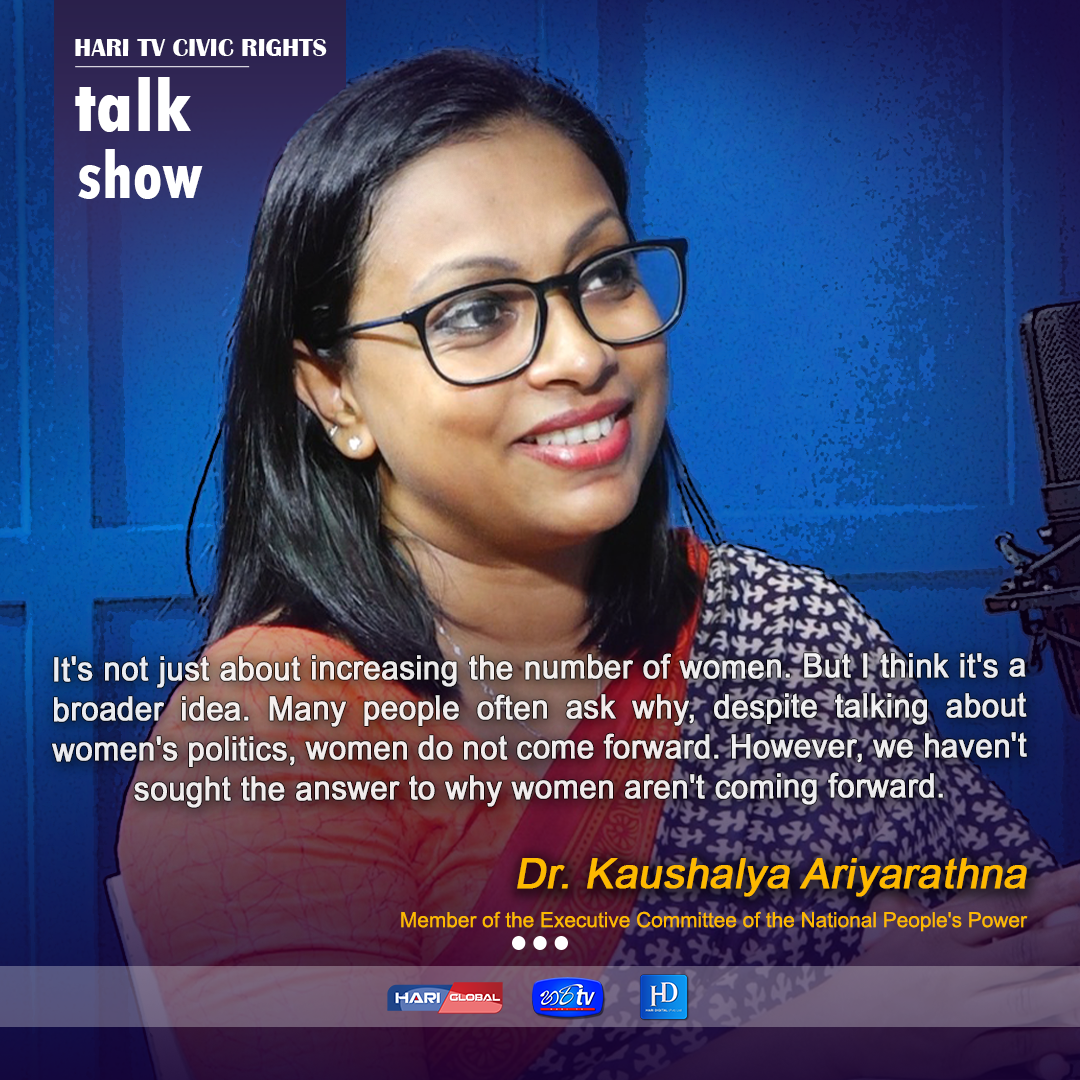The current episode of the TV series discussing citizenship rights will focus on women’s political participation and educational rights in Sri Lanka. Joining the discussion as a resource person is Dr. Kaushalya Ariyarathna, a consultant at the Human Rights Studies Center at the University of Colombo and a member of the Executive Committee of the National People’s Power.
How much motivation do women gain from the National People’s Power’s initiative ‘Women We Are One’, which has even faced social bullying recently?
The National People’s Power did not start this initiative solely with the aim of an election. How are the 52% of women in Sri Lanka being politically empowered? This is not just a solo effort but something organized extensively. We reached out to them at the village, town, and district levels as well. Social media rallies were organized for these district committees. Bullying in politics is specifically targeting women.
Is it possible for a woman to endure this bullying? What is your personal opinion?
It is indeed very challenging. Personally, I avoid using social media because of this bullying. Especially when we introduce a new idea, criticism is often targeted not at the idea or its flaws but at the personal life of the person presenting it. However, those who launch these attacks rarely come out openly to engage in direct criticism. They operate anonymously. That’s why we refer to them as “keyboard heroes”. We were aware that women in politics would face such illogical attacks, and we even taught them how to confront these issues. Our goal is to propel women forward with a non-traditional approach. Even if we use terms like “women,” the term “female” is used deliberately to avoid using traditional terms.
Despite discussing women’s rights, only about 5% of the 52% female population actually represents the parliament. What is your view on women’s political participation?
Women’s political participation involves not only increasing the number of women representatives in parliament but also engaging them in broader social and political responsibilities. A common argument is that women are not coming forward, that they are unwilling. The reason is the historical burden of domestic duties and the prevailing social expectation that women are solely responsible for family care. We often hear, “No matter what, if the family isn’t okay, nothing else matters.” I have been told this as well. Additionally, the perception is that politics is a very violent field, and social assumptions suggest that money and family influence are necessary to enter it. The National People’s Power aims to dismantle this traditional notion. We want to create a woman who views politics as more than just casting votes. Without this, sending a few women to parliament will only replicate past practices.
What is your strategy to make these issues impactful or meaningful?
As the National People’s Power, our goal is to achieve at least 50% female representation in parliament. We understand this cannot be accomplished overnight or in a single night. Another issue is that women who work unpaid labor at home cannot engage practically in politics unless the government provides mechanisms to relieve these duties. We have a long-term plan for ensuring safety and assurance for them.
As someone professionally involved in education, what is your direct answer to whether Sri Lanka has a free education system?
Although Sri Lanka has a system of free education, it is not truly free. There are numerous practical issues. On one hand, education is being commodified daily. While there is provision for free education up to the advanced level within the school system, how to monetize this system for profit seems to be the emerging trend. The National People’s Power identifies three universal rights requiring immediate solutions: food security, health, and education.
What changes and reforms are needed in the school and university systems in Sri Lanka?
We need a transformative change rather than just superficial modifications. We can no longer continue with the existing system. Our education system is based on competition, recognizing only the top students in a class. This outdated system has become obsolete. We need an education system based on skills. We are currently trained to become doctors or engineers, but there is no system in place to help us identify and develop our skills early. An educational system based on principles such as love, empathy, and competence needs to be developed, replacing the current one.
Regarding human rights, it seems that understanding is limited to certain levels in our society. Shouldn’t there be broader awareness within the education system?
Since 2007-2008, I have been working in the field of human rights. People are aware of human rights, even in very rural areas. However, there is a belief that knowing about human rights is futile if they are not implemented. The real issue is not the lack of awareness but the lack of power to enforce these rights. A mechanism with real power needs to be established.
Domestic violence is closely linked with human rights issues. Are women aware of this?
Yes, they are aware. But there are also those who believe women should just endure it. Since the 1990s, organizations have conducted workshops in rural and remote areas, indicating that there is no lack of awareness. The practical issues include how to live independently, face society, and raise children when separated from one’s family.
What is your opinion on the youth facing economic and social challenges today?
Clearly, the youth in this country are experiencing a sense of disillusionment. If you ask a young person about future expectations, many will say they want to leave the country. This indicates that the country is not perceived as secure for them. Additionally, even if they want to change things, they feel there is no space for them within the current political system. Power dynamics are shifting among families and groups.
August 29, 2024

